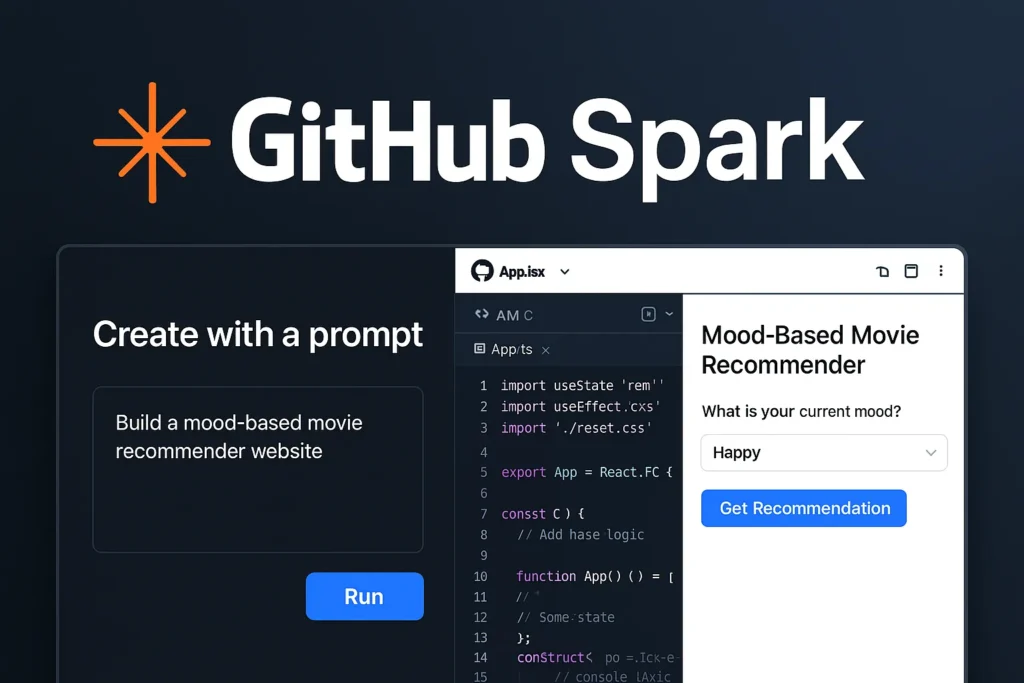GitHub Spark AI is Microsoft’s powerful new no-code tool that’s changing the way we think about building software. From time to time, something really cool turns up in the world of tech and you just want to sit and wonder what comes next. Got an app idea floating around? A simple website, a useful little tool, maybe even a custom dashboard? Imagine it jumping straight from your brain to the screen, totally working, in moments. No endless setup, no config headaches – just pure creation. That was science fiction, once, but these days? It’s actually real, right within GitHub.
What Is GitHub Spark AI?
Microsoft has quietly rolled out GitHub Spark AI, a tool that turns plain-English prompts into full-stack applications. Imagine typing “a mood‑based movie recommender website” and bam it scaffolds frontend, backend, database, hosting, everything. No boilerplate, no server config, no domain juggling. It’s like development magic. Microsoft unveiled this as part of GitHub’s public preview on July 23, 2025, for GitHub Spark Copilot Pro+ subscribers. Seriously. I tested it within hours.
How GitHub Spark App Builder Works
It’s intuitive. You start with a prompt to app GitHub Spark workflow: write a description, hit run, and it brings up an interactive preview live, editable, smart. I asked for “to‑do list with weather widget” and got six subtly varied options automatically. Picking one spawns a GitHub repo with Actions, Dependabot standard devops scaffolding. Everything is clickable, live, and editable.
You’re free to switch from natural-language to visual editing, even to full code via GitHub Spark app builder. Select a different AI backend model Claude Sonnet 4, GPT‑4o, o1‑preview, or o1‑mini at any stage, and see how app variants change accordingly.
Pricing and Access: GitHub Spark Copilot Pro+
Only Copilot Pro+ users get this as of launch. That’s roughly US $39/month for up to 1,500 premium requests per month. Every prompt uses four premium requests so a single generation costs $0.16 if you exceed your quota ($0.04 per request).. Deployment is currently free, but subject to usage limits (HTTP requests, storage, etc.) and apps get unpublished when limits hit. Future billing models will change that GitHub Docs.
Behind the Curtain: Technology and Capabilities
Built by Copilot, Spark processes prompts with contextual awareness of your code history, error logs, revision variants all get fed into the AI so it understands your evolving intent. Its runtime, powered by the Spark SDK, supports secure, scalable deployments with authentication, persistent data, inference capabilities using models from OpenAI, Meta, DeepSeek, xAI without needing API keys
Security and bugs? You still must review generated code. Spark may misinterpret prompts or produce vulnerable patterns. It’s probabilistic by nature. Use preview, test thoroughly, especially on apps handling sensitive data..
Use Cases & Real‑World Vibes
I fired one spark: “budget tracker with category pie chart.” Within seconds, I had React UI, Node.js backend, SQLite, simple auth. Click deploy. Done. It’s prototyping brilliance.
Product managers and designers can prototype without messing with Terraform or Docker. Students can sketch apps. Developers save time on CRUD scaffolds. But don’t expect enterprise-grade microservices or complex logic apps; those still need human craft.
Spark seems suited for “common/personal applications” productivity tools, dashboards, utilities. Complex workflows? That’s still on your team or an AI coding agent perhaps (see GitHub’s agent features for Copilot Pro+ users).
The Good Stuff
- Ridiculously fast prototyping from natural language to live app
- Model choice keeps things flexible and exploratory
- Visual variant options spark creativity
- Integrated into GitHub ecosystem Actions, Dependabot, Codespaces
- No need to manage hosting, infra, or API keys
Caveats & Concerns
Quite powerful but not magic. If your prompt is vague? You’ll get generic output. If handling personal data review code. If using in regulated fields, take care. Current quota for Pro+ feels tight (300 sets of app prompts a month) and could be limiting for heavy users and public preview means quality is still evolving. It’s not perfect yet.
Why It Matters
Because GitHub Spark AI could radically alter who “gets to build apps.” Non‑coders can launch tools. Developers can prototype faster. It shifts value from boilerplate to problem-solving strategic design, ethical thinking, domain insight.
This isn’t just another AI app builder; it’s a harbinger of no‑code AI development that sits fully inside a professional code platform. That creates new paradigms.
Conclusion: GitHub Spark AI, Re‑Imagined
GitHub Spark AI emerges as a prompt to app revolution especially for startups, student projects, internal tools. It is cutting‑edge but also human‑centered. Irene in the product says she built her prototype in ten minutes then turned it over to devs who polished it further. That’s exactly the hybrid future Spark enables.
Will it replace developers? Unlikely. But expect roles and workflows to shift. Code will become the grammar of intent, not the entire essay until now. Honestly? I’m intrigued, cautiously optimistic. But I want your take: Have you tried it yet? What’s your wildest idea for building an app with GitHub Spark? Drop a comment, let’s kick off discussion.

